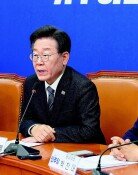`U.S. Jittery Over Post-Kim Jong Il Era in N. Korea`
`U.S. Jittery Over Post-Kim Jong Il Era in N. Korea`
Posted September. 16, 2008 08:37,
U.S. President George W. Bush, who once called North Korean leader Kim Jong Il a tyrant whom he loathes, is paying close attention to Kims health in indicating U.S. worry over what will happen if the dictator dies or loses power, according to foreign media.
The New York Times said Sunday a surprising ambivalence characterizes the Bush administrations stance over news of the health of the reclusive country`s leader.
The report said Washington is worried over the potential for a terrorist group to obtain the Norths nuclear weapons and chaos that could leave everyone wondering who is in control of its nuclear arsenal if and when Kim loses power.
The American bomb-watching community also says the Norths nuclear weapons are kept safer under Kims control. The United States also showed uneasiness over control of Pakistans nuclear arsenal last month when Pakistani President Pervez Musharraf stepped down.
Newsweek magazine said Washington can only hope that Pyongyang is not on the verge of a succession crisis. The weekly said the United States is not fully prepared to tackle a sudden shift in power in the North and is afraid of who might take control of its nuclear arsenal.
Japanese media have provided detailed analyses on the cause of Kims stroke and his symptoms.
Quoting a Chinese government source, the daily Tokyo Shimbun reported yesterday that Kim collapsed due to stress caused by the delay in removing North Korea from the U.S. list of terrorism-sponsoring countries.
The source said Kim collapsed on Aug. 14 after suffering from both cerebral infarction and cerebral hemorrhage; some blood vessels were blocked and others ruptured in his brain. Kim was known to be under extreme tension until Aug. 11, when the North was expected to be delisted.
The Tokyo Shimbun said Beijing immediately dispatched five medical specialists after Kims collapse. Having undergone surgery, he is reportedly recovering at Bonghwa Treatment Center on the outskirts of Pyongyang.
Citing North Korean officials, the Mainichi Shimbun also said Kim has lost consciousness at work several times since April and has not properly responded to major issues in time due to his seriously declining health.
The daily also said he has not been able to work at night from May or June and his decisions on the six-party nuclear talks have become less flexible and rational as his health worsened.
sya@donga.com surreal@donga.com







